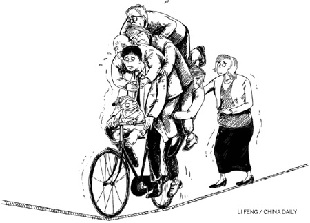

Mu Guangzong: Senior citizens need better treatment
The draft law on senior citizens, which requires people to visit their aged parents regularly to help fulfill their emotional and spiritual needs, indicates that taking care of senior citizens has become a serious problem in China.
An aging population reflects a country's advancement in science and technology, and higher standards of living. But it poses a challenge, too, for it creates new problems for the country.
The number of people aged 60 years and above in China has risen to 160 million, or more than 12 percent of the total population. An aging society, according to international standards, is one that has more than 10 percent of its population above the age of 60.
The number of aging people in China is likely to increase until it reaches to about 240 million, 17 percent of the population in 2020, when the country will have about 30 million people over the age of 80. China's economic and social structure and function are still in the reformatory stage and, hence, cannot keep pace with the rising number of elderly people.
To begin with, China has the largest population of aged people in the world. Surprisingly, it took only 18 years for the China's population to transform from relatively young to aging. In contrast, it took several decades or even more than a century for such a transition to take place in developed countries. China's aging population also has different sets of problems in different areas.
China's pension and welfare systems are not yet strong enough to deal with an aging population. When developed countries encountered an aging population, their per capita GDP was between $5,000 and $10,000, but China's was only $806 in 1999 when 10 percent of its people passed the age of 60. China's per capita GDP may be nearly $4,000 now, but it is still below what it was in Western countries' when they first encountered an aging population. As my fellow researcher Zheng Bingwen, of the Chinese Academy of Social Sciences, calculated in July, China now needs another 1.3 trillion yuan ($196 billion) to ensure that its aged people get enough pensions to lead a decent life.
The situation is even more severe in the countryside, where an increasing number of senior citizens are left to fend for themselves as the younger people migrate into cities in search of "greener pastures". Apart from more pension funds, China also needs more human and material resources to provide for its aging population.
The country has about 38,000 care homes for the elderly, which have about 2.4 million beds. That means only about 15 beds are available for every 1,000 senior citizens in China compared with 50 to 70 in Western countries. The tragedy is that 20 percent of the available beds in China lie vacant because of the economic and other problems that aged people in the country face. To build social security and service systems for senior citizens, the government should first try to find out what exactly old people and their families need. In the macro background of the aging population, a popular practice across the globe is shifting the focus from family support to building professional centers for senior citizens. Such centers require the government to provide financial support and a strict monitoring to ensure quality service.
At a time when socialized care services are being developed further, the government needs to think seriously about what its responsibilities are and what role it can play to help the elderly.
Responsibility is an important factor. The liability of taking care of the elderly should be shared by individuals, families, organizations and the government. But the government has a social and historical responsibility to play the leading role. Perhaps the government's greatest challenge is the developing nature of the national economy and the building of more old age homes.
Compared with many Western countries that faced the problem of aging populations after becoming developed economies, China is still a developing country and thus has fewer resources to provide for its aged people. That's why it cannot build old age homes and other facilities for senior citizens at the pace that its population is aging.
Broadly speaking, the government has three roles to play. Its first role should be as a designer and provider of pension services, the second as promoter of socialization, standardization, and professionalization of the services for senior citizens, and the third as constructor and supervisor of the services - taking care of the system to deal with the differences between urban and rural areas, and different age groups of the elderly people.
Since China has to deal with an aging population without having the advantage of a developed economy its care system and services for the elderly may stay at a relatively low level for a while. So, the government needs to strike a balance among equity, quality and efficiency.
The author is a professor at the Institution of Population Research, Peking University.